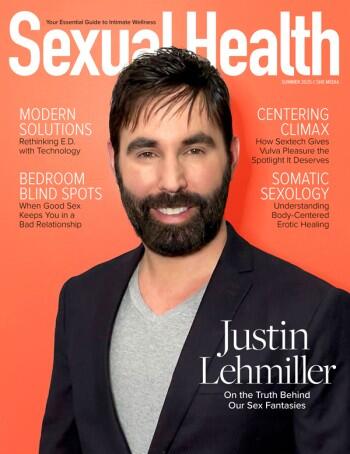SAN FRANCISCO — Last week Center for Sex & Culture co-founder Carol Queen issued a letter on her 59th birthday calling on the sex-positive community for support following an increase in the community center’s rent and other expenses.
The CSC offers the largest known publically accessible sex-related library, and regularly hosts the LGBTIAQ community, as well as “sex workers, kinky folk, and others in the big world of sexuality; hosting memorial services for sex community people whose full selves are not welcome at family funerals; maintaining a gallery for artists who may not always be able to show their most sexual work anywhere else; hosting all kinds of sex education classes, and prioritizing cultural events because the arts are, for many, the only way they regularly grapple with issues of sex and gender,” Queen said in her letter.
“We'll pay $6,700 per month in rent on Aug. 1; that's just about twice what we were paying a year ago. In September our annual insurance payments come due, and we will need to raise another $5,000 for that, roughly. We get almost no corporate support (except for a certain SF-grown 'net business that has been generous to us every year), and the largest single other donor is Charlie Anders, who runs Writers with Drinks every single month as a benefit for us,” Queen said.
This year, Queen says the CSC is focusing its summer fundraising on one virtual event — Give OUT Day on Aug. 2. To donate to the CSC, click here.
In this exclusive Q&A with Queen, she discusses the CSC’s history, accomplishments and why the adult industry should support its community.
XBIZ: What inspired you to establish the Center for Sex & Culture?
Carol Queen: In 1994 my partner Robert Morgan Lawrence and I were visiting our friend Betty Dodson in New York. Then actively doing her Bodysex women’s masturbation and sexuality workshops, she told us she didn’t have a place in the Bay Area to do them. “You kids should start a place!” she said, and Robert and I realized that maybe she was right — we had relationships with many different sexuality communities, knew many people who might be supportive, and had a ton of books and papers that could form the core of an archive. We talked it up for years, until finally a friend took us to dinner and became the angel donor who paid for the lawyer that helped us become a nonprofit. We got California and then federal nonprofit status in 2001. Our first location, into which we moved in 2004, was shared with Carol Leigh (aka Scarlot Harlot), the sex worker activist. The current space (which has just sustained the large rent increase) is our fourth location, and we keep it rolling with a core group of terrific volunteers and interns. And P.S. — the archive and library are full of interesting things, and our books and stuff are still at our house! People began to donate archival items right away, as if they were just waiting for a place like ours to drop their books and papers off.
XBIZ: Discuss the dedication of the CSC. What keeps you motivated to continue to serve the community?
Queen: Becoming a nonprofit makes you legally bound to the community, but it happens emotionally as well, in my experience. We wouldn’t have begun the project if we didn’t believe in it, and thought that others would too ... and we were right. Now when I get a little fatigued, it’s really enough just to think of all the amazing events that have happened at CSC through the years, how many organizations and teachers regularly use the space (at least 20 hold their own events at CSC between bimonthly and quarterly), and how proud we are when a researcher finds something they would not otherwise have seen. No matter how scary or unpredictable it may be to operate in this new and very expensive San Francisco, S.F. still has a reputation and history to maintain within the world of sexuality … and now we are one of the entities that helps maintain it. That means we can continue to serve and foster the San Francisco that WE want to live in… the reason we came here in the first place. And in fact we are more than a local phenomenon, even though the rent raise has made us put on hold another dream, to webcast more of our events. We do think of ourselves as a national, even international resource, though.
XBIZ: How has the organization evolved and grown through the years?
Queen: The two most obvious elements are that we have grown from Robert and me doing much of the day-to-day maintenance and operations to being part of a team. Key volunteers have joined us gradually, and each of them has a special interest, focus, or skill that helps us do a better job in the world. That’s linked to the other answer: We started out thinking of ourselves as especially about sex education, but we have really grown into the “and culture” part of our title. Dorian Katz (a fabulous artiest with a degree from Stanford) came and developed our gallery program; her partner Marlene Hoeber took on the archive; Library Vixen is a real-life librarian who tackled getting the books better organized. (We have something like 7,000 books, and we believe we are the largest publicly-accessible sexuality library around.)
We host cultural events like book parties and readings (including the quarterly series “Perverts Put Out”), theatre (including Richard Pacheco/Howie Gordon’s son Bobby Gordon’s solo show "Debbie Does My Dad”), storytelling (including Gina Gold’s "TMI: Sexworker Confidential" every two months), and burlesque. We’re in talks with Good Vibrations about a film series. Plus we produce or host classes for people who want to make art that’s sex-related: our Erotic Reading Circle for writers (we published a book of stories first shared at that event, “Sex Still Spoken Here,” via Indiegogo crowdfunding support), Tarts & Crafts arts and crafts night, Red Hots Burlesque School of Shimmy classes, and Madison Young’s Erotic Film School, to name a few examples.
Sex ed classes are valuable and many people want to learn more about sex — but almost everyone has some special relationship with cultural production that helps them think about, learn more about, be entertained by, or otherwise engage with sex and gender issues, be it film, TV, fiction, porn films, or fine art. Cultural media ARE our sex education in this country, for better or for worse.
XBIZ: Discuss the CSC’s impact. How popular are CSC events and resources?
Queen: We have a dedicated core group of people who come to many events, but because we seek to be a really diverse space, even more people only attend those events that they identify with. That, ironically, is one of our challenges in getting the word out: gay men think we’re for lesbians, straight people think we’re queer, monogamous couples have heard that we’re all about sex parties. We are interested in the full range of sexuality, from street sex to academic research, and all across the spectrum. (The only thing we will not collect and preserve is underage material.) So we’re there for just about everybody, and try to produce and host events accordingly.
Besides the people who use the library and attend classes and events, we also provide support for researchers and resources for authors who are working on sex-related projects. We have unique material in the archive and are always glad to hear from people who can use it to support their projects.
And ironically, one of the most successful things we do is the most bittersweet: We host memorial gatherings, most of which I produce myself (often with help from Annie Sprinkle, who has been personally connected to a number of people we’ve held them for). Sex people may not always be adequately memorialized, in their whole selves, elsewhere — and even if they are, often fans are not invited. We open our doors to fans as well as friends and family, and when appropriate, record peoples’ tributes. These are actually my favorite events at CSC; they are so moving. We’ve remembered Juliet Anderson/Aunt Peg, John Leslie, Jamie Gillis, Candida Royalle, and just this month Charles Gatewood, among others. Just last week we had a rare memorial gathering for someone who is still alive: Joani Blank, founder of Good Vibrations, who has been diagnosed with pancreatic cancer and who may not be with us much longer. It was a treat to see her present and able to actually experience the tributes.
XBIZ: Why should the members of the adult industry contribute to the CSC?
Queen: We care deeply about the cultural output, history, individual artists (and their memoirs!), politics, and general discourse of and surrounding the adult industry. I was trained at the Institute for Advanced Study of Human Sexuality to respect this all as erotology — a society’s cultural output regarding sex — and to feel that it must be protected, respected and preserved. We’ve welcomed Georgina Spelvin, Richard Pacheco, Serena, Annie Sprinkle, and other legacies of porn to CSC when they have a book or other project to put before the public. We work with our Bay Area queer porn community frequently, and sometimes collaborate with our neighbors at Kink.com. We’ve hosted “Marriage 2.0” performers and behind-the-camera folks, and were excited to feature a trans porn panel a couple of years back. We made space for Gerard Damiano’s son to film participants in his film tribute to his dad.
Our advisory board includes Nina Hartley and Ira Levine, Annie Sprinkle, Layne Winklebleck and Kat Sunlove (formerly of Spectator magazine), Constance Penley, and Betty Dodson. We have relationships with jessica drake, Tristan Taormino, April Flores, Jiz Lee, Shine Louise Houston, Shar Rednour and Jackie Strano of SIR Productions, Madison Young, Courtney Trouble (who filmed a porno at a Masturbate-a-Thon), Siouxsie Q, Maggie Mayhem, Kitty Stryker, Magnus Sullivan, and Susie Bright. And CSC (via me) was a plaintiff in the recent lawsuit seeking to overturn 2257 laws (our Masturbate-a-Thon fundraiser was live-streamed a few times and 2257 really doesn’t make it any easier for a nonprofit to keep records than it does a porn company). I was a Free Speech Coalition board member back in the mid-1990s, and I have always thought of the adult community as a significant piece of my community — I’ve done enough time in front of a camera to really feel that, and CSC’s priorities reflect that as well. We take the adult industry seriously, hope to represent that idea widely, and are so grateful when adult acknowledges us and supports us: which can happen via tax-deductible contributions, which we very much need now; Give OUT Day participation or helping us spread the word about it to fans (again, the date is Aug. 2 and the link is https://www.giveoutday.org/c/GO/a/sexandculture); event bookings with us; and other collaborations. We’re on Twitter at @CentrSexCulture, for those who want to follow us and boost our signal, and you can also find us on Facebook and Instagram.









